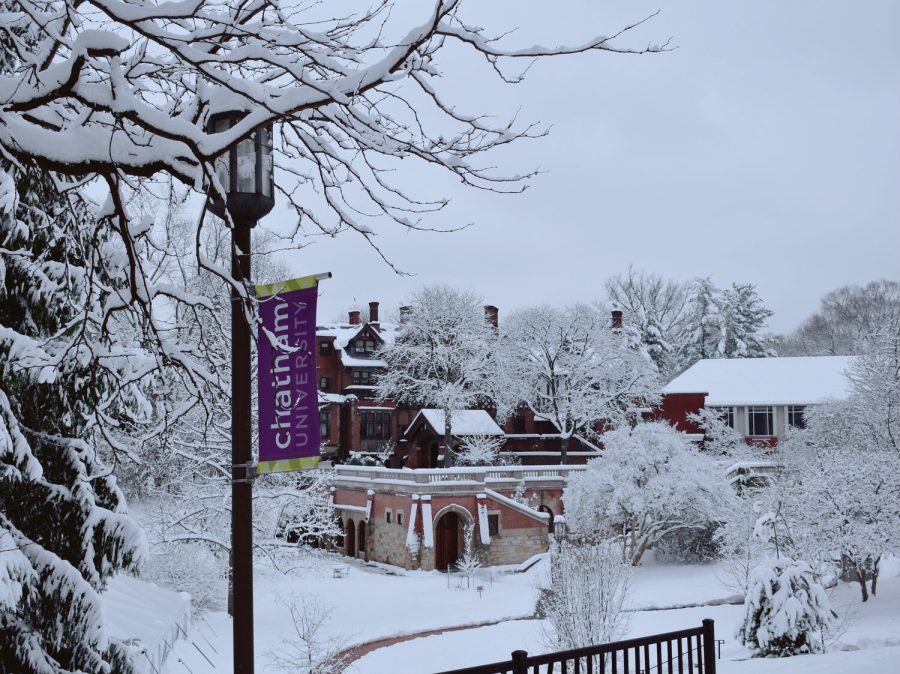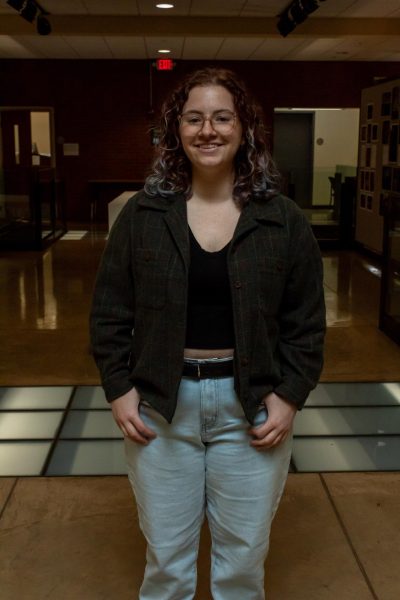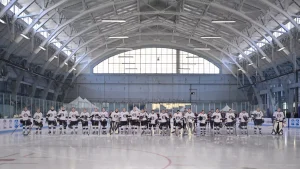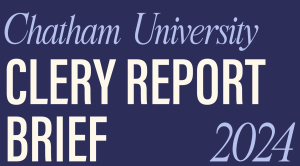How Chatham’s return-to-campus policies compare to other universities
February 7, 2022
The COVID-19 Omicron surge hit the United States just as colleges around the country were preparing for winter break. As a result, many schools had to re-evaluate their COVID-19 safety procedures for the spring ’22 semester.
Here’s a look at Chatham University’s policies and how they compared to those of other nearby schools.
Chatham University
Chatham University announced the first round of information regarding returning to campus via email on Dec. 22, 2021. The University decided to hold classes virtually for the first week to accommodate entry testing for all students.
Students were required to get tested within 48 hours of returning to campus, and Chatham offered tests to students during the week of Jan. 3. Due to the high number of cases shown through the result of entry testing, online classes were extended through Jan. 18.
After Jan 18., it was left up to professors to decide when they wanted to return in-person, with a deadline of Feb. 4 to transition to the delivery mode originally listed for the class.
“I don’t like that they put a hard limit on returning to in-person. I feel like most students prefer to have hybrid learning where you get to pick if you want to be in-person or not,” said Rylee Napolitan ‘23.
In addition, Anderson Dining Hall only offered take-out options through Jan. 29, and Café Rachel suspended in-person dining and studying until Jan. 28.
Chatham also updated mask policies, no longer permitting gaiter-style face masks. The University encouraged the use of N95, KN95 and surgical masks and provided two KN95 masks for any student or employee who needed one.
“I do wish they would have supplied more [masks], especially with their recommendations,” Napolitan said. “Not everybody can afford N95 masks, and the school can’t expect them to spend a big chunk of money on special masks.”
“I have definitely found myself seeing that more people are wearing KN95s, which is nice, but I do understand that it is hard to get them,” said Will Grasso ‘24.
Point Park University
The Point Park University spring ‘22 semester began Jan. 10 without a virtual learning period. Entry tests were not required but encouraged by university administration, and students were asked to quarantine for five days prior to returning to campus.
“Given the high vaccination rate among our students, along with the established effectiveness of our safety protocols throughout this pandemic, we believe we can safely and carefully return to campus as planned,” said Point Park President Don Green in a letter to the campus community obtained by the Communiqué.
University of Pittsburgh
University of Pittsburgh (Pitt) allowed residential students to return to campus on Jan. 8 for the spring ’22 semester. All faculty and students were required to get tested before or shortly after returning to campus.
During the first 2 1/2 weeks of the semester, the university operated remotely.
“We have to wear masks within university buildings, classrooms and residential buildings. For the most part, people are pretty good about mask wearing,” said Pitt student Jannah Farag ‘24.
Once campus life resumed, classes began on Jan. 10 and were only offered virtually until Jan. 27. Once in-person classes resumed, there were few options for hybrid learning. Many students voiced concerns by signing a petition pushing for virtual learning options.
“I do worry that because there is no universal online option, that a lot of students will come to class feeling sick and not get tested because they are worried about falling behind,” said Pitt student India Krug ‘24.
Pitt required all community members to be vaccinated by Dec. 6. Students were told that their ability to enroll in classes for the spring term would be suspended without documentation of vaccination. The Pittsburgh Post-Gazette reported on Jan. 10 that Pitt had disenrolled several students.
Carlow University
Carlow University began the spring ‘22 semester on Jan. 10. All classes were conducted remotely until Jan. 24 to ensure the campus was prepared for in-person classes and that all community members were vaccinated (with exceptions for medical and religious reasons). Any individual who is not vaccinated has to be tested weekly.
Carnegie Mellon University
Carnegie Mellon University (CMU) began classes for the spring ‘22 semester on Jan. 18. The first two weeks of classes were delivered virtually, with exceptions for some labs and research. Students and faculty returned to in-person classes Jan. 31.
Entry tests were required upon the return to campus for students and faculty, regardless of vaccination status. Unvaccinated students are required to test weekly.
“Tests are very available,” said CMU student Eli Slothower ‘25. “We have our own in-house testing called Tartan testing. They are available throughout the week. CMU is also working on putting up vending machines for free rapid at-home tests over the weekends when Tartan testing is closed.”
Masks are required in all campus facilities. There are no requirements regarding the types of face masks faculty and students should wear on campus.
“As of right now, the policy is that you just must wear any kind of mask. In Omicron, cloth masks don’t protect you as much so that is probably one thing that they could do better,” Slothower said.
Everyone on the CMU campus was required to be both vaccinated and boosted against COVID-19. Anyone who is eligible for a booster was to have received it within 60 days of becoming eligible.
Duquesne University
Duquesne University began the spring ‘22 semester on Jan. 10 with a flexible arrival period. The first 10 days of classes were offered in a hybrid format, and students could choose if they wanted to attend in-person classes. All individuals were required to submit a negative COVID-19 test 48 hours prior to their arrival on campus.
In communications with the Duquesne University community, President Ken Gormely said, “It’s important to emphasize that we’re still starting the semester on time. In order to redouble our commitment to the wellbeing of our students, we will put enhanced safety precautions in place, including increased testing, mandatory indoor mask requirements and clear vaccine policy rules to guide the campus until the Omicron surge subsides.”
Robert Morris University
Robert Morris University (RMU) returned to in-person classes Jan. 10, without a period of virtual learning. The school encourages virtual interactions for meetings whenever possible.
“I think that everybody at RMU wants to be in-person. When COVID-19 started, we all had a hard time learning online,” said RMU student Collin Asmonga ‘22.
The university mandated entry tests for everybody returning to campus, regardless of vaccination status. Unvaccinated students have to be tested for COVID-19 every 10 days. RMU requires all students to be vaccinated (with select exemptions) and encourages them to get boosters when they become eligible.
Masks are required inside all campus facilities. The school discourages cloth masks in favor of surgical masks, N95s and KN95s and will provide masks to any students who need them.
The RMU ready plan was updated for the spring ’22 semester, and all changes due to the Omicron variant were communicated to those on campus.
“The [administration] does listen to students and kind of makes sure that everybody is comfortable. They have done a really good job at making sure everyone is safe,” Asmonga said.
A common thread: students will be students
A common theme from students across the Pittsburgh universities is that, regardless of the policies put into place, it is up to the students to do what they think is in their best interest.
“When you leave it all up to individual responsibility for young people, who are just entering adulthood and learning about what it means to be responsible and independent, it is a lot to ask of a college community,” Krug said.








